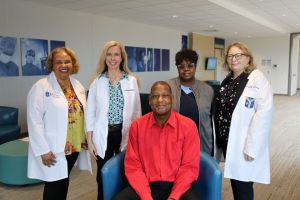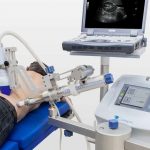By Krista Lentine and Deryl Cunningham
Long overdue, the medical community increasingly is turning its attention toward understanding and addressing racial and ethnic health disparities. We – a physician and a patient – write to shed light on kidney disease, an area where racially based health disparities are stark and where more research is needed so that we can change this pattern.
A Genetic Clue
As they look more closely at these disparities, researchers across the country are reassessing how doctors factor in race when treating people with chronic kidney disease.
African ancestry is associated with an increased risk of kidney failure following living donation. Moreover, kidney transplants from deceased donors with African ancestry have an increased risk of graft failure compared to organs from non-African ancestral donors.
Recent breakthroughs in medical genetics have revealed that a portion of kidney failure affecting African Americans is mediated by genes – and those genetic variants, not race – account for that increased risk.
Kidney risk variants in a gene called apolipoprotein L1 (APOL1) are present only in persons of African ancestry. Inheriting two risk variants – one from each parent – is associated with an increased risk of kidney failure, and this high-risk genotype is present in 15% of African Americans.
While currently, there are no approved treatments for APOL1-related kidney disease, scientists are actively seeking to develop novel treatments to stop the damage. In addition, individuals with high-risk genotypes may benefit from better blood pressure control and other kidney risk factors management.
Importantly, though, APOL1 high-risk genotypes do not destine a person to develop kidney disease. Rather, additional genetic and/or environmental “second hits” are likely required for disease progression. These “second hits” may include environmental and social determinants of health, as well as biological factors.
Categorizing race as a biological construct rather than a social one contributes to health care disparities in kidney treatment and transplants.
An Opportunity
Despite the critical need for new information to understand kidney disease risk and find targeted solutions, there are disparities in research participation and a lower likelihood of organ donation in the African American community.
As a researcher and a participant in studies aimed at changing these trends, we write to encourage African Americans to consider participating in new research to help improve kidney treatment transplant outcomes.
The national APOLLO study is coordinated by 13 lead centers in the U.S. to engage transplant programs across the country. Eligible participants include living kidney donors, recipients of a kidney transplant from an eligible living or deceased donor with recent African ancestry, and recipients of multiple organs transplanted simultaneously. Researchers seek to enroll at least 2,614 donor-recipient pairs.
Over the last 5 years, the national APOLLO trial has studied almost 4,000 donor kidneys, 2,700 recipients of those kidneys, over 250 living kidney donors, and over 230 of their recipients. The consortium will continue to recruit additional deceased donor transplant recipients through 2023 and continue transplant recipient follow-up and recruitment of living donors and their recipients for another 5 years.
Transplant researchers will examine whether genes of kidney donors and their recipients play a role in the health outcomes of transplant recipients and living donors. That information could change the way doctors consider race when they examine patients’ risk factors.
Grounded in feedback from community advisors, we believe the national APOLLO study provides models of vitally needed, patient-centered clinical science with a strong potential to overcome critical disparities in kidney disease risk assessment and care through precision medicine techniques.
To learn more about these studies, call 314-577-8765 or email krista.lentine@health.slu.edu.
Krista Lentine, M.D., Ph.D., is a professor of medicine in the Department of Internal Medicine at Saint Louis University School of Medicine. Lentine is associate division director of nephrology and medical director of living donation at SSM Health Saint Louis University Hospital. She serves as the Mid-America Transplant/Jane A. Beckman endowed chair and co-director of clinical research in the Abdominal Transplant Center at SSM Health Saint Louis University Hospital.
Deryl Cunningham is a patient advocate, kidney transplant recipient, and participant in the Saint Louis University APOLLO study at SSM Health Saint Louis University Hospital.
The opinions on this page are those of the writers and not necessarily those of the AFRO. Send letters to The Afro-American • 233 E. Redwood Street Suite 600G
Baltimore, MD 21202 or fax to 1-877-570-9297 or e-mail to editor@afro.com
The post Op-ed: Community Invited to Engage with Researchers to Overcome Disparities in Kidney Disease and Transplantation appeared first on AFRO American Newspapers .










